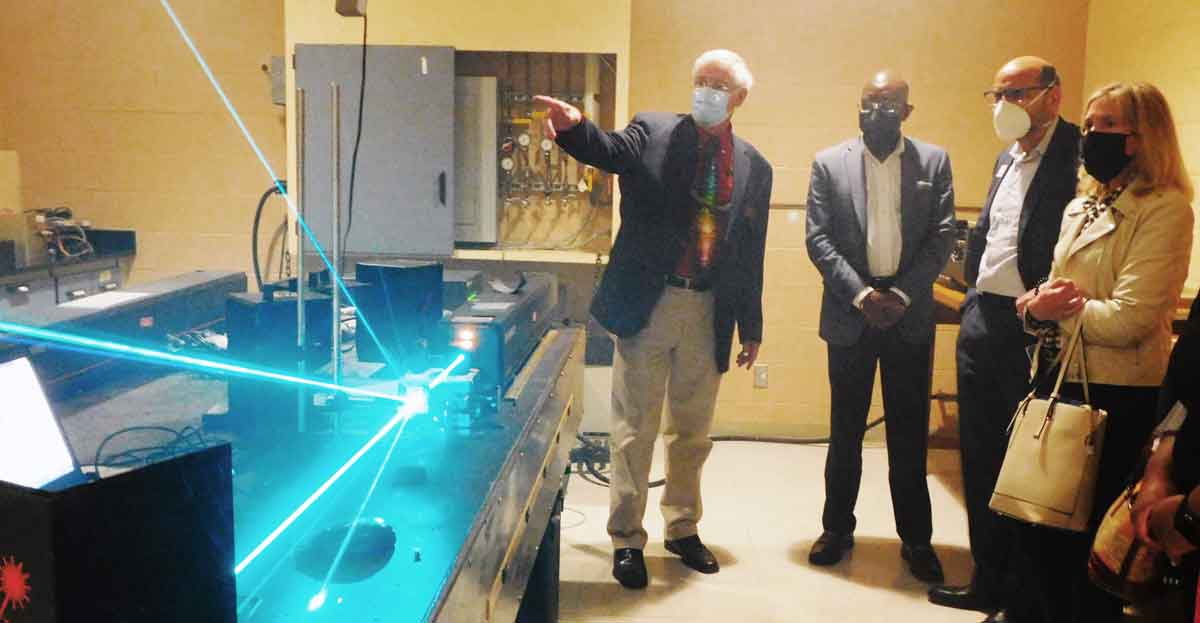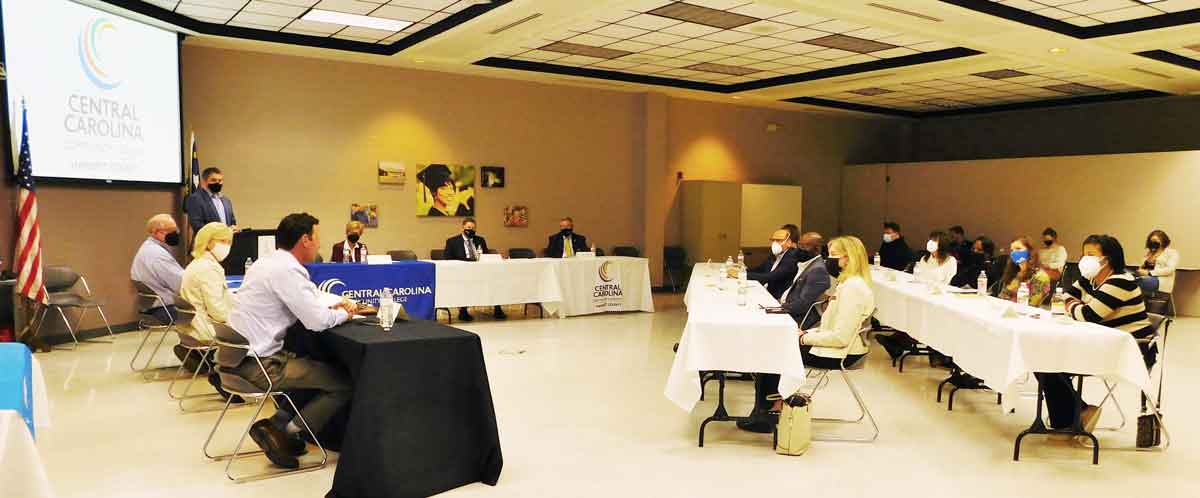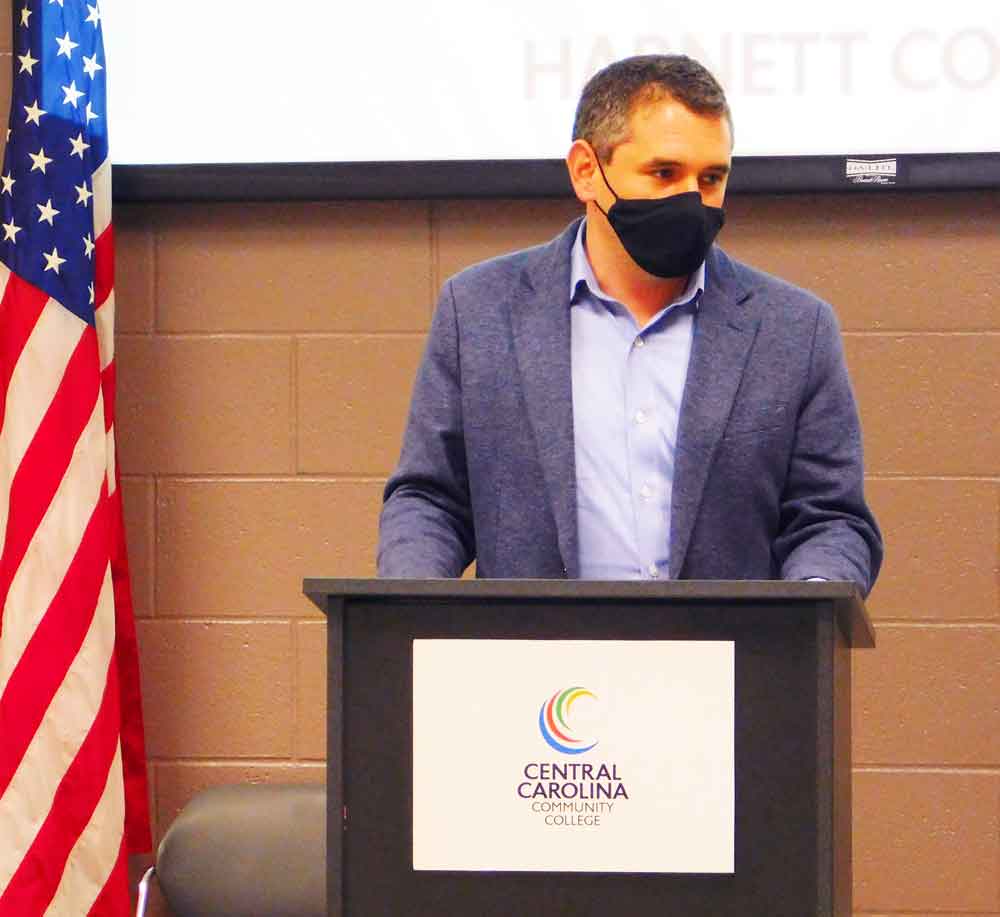
College News
CCCC hosts Blue Cross Blue Shield of NC executives
02.14.2022 • Admin, Faculty & Staff, College & Community, College General
LILLINGTON - Health insurance executives met with community leaders in Harnett County on Friday, Feb. 4, to analyze challenges facing the local workforce and consider how healthcare providers might help prepare people for high-skilled, high-demand jobs that can improve the entire community.
CEO Dr. Tunde Sotunde and other executives from Blue Cross Blue Shield of North Carolina visited the Central Carolina Community College Harnett Main Campus in Lillington as part of its Extra Miles Tour, an ongoing initiative featuring visits in every county statewide to understand diversity across North Carolina, celebrate local efforts making a positive impact and find ways to improve residents' health and well-being.
"The Extra Miles Tour is the perfect opportunity for Blue Cross NC leadership to listen and learn from our members and the communities we are fortunate to serve," Dr. Sotunde is quoted as saying on the company website. "We know that the most powerful way to connect with others is to listen, and we are building relationships that will help us better serve our state."
During their two-hour stop in Lillington, the Blue Cross Blue Shield executives sat in on a panel discussion among leaders from across the community. The panel included Cory Hess, President and CEO of Harnett Health; Angie Stewart, Economic Developer for Harnett County; Pat Godwin Jr., Corporate President of The Godwin Group; Dr. Lisa Chapman, President of Central Carolina Community College; Dr. Aaron Fleming, Superintendent of Harnett County Schools; and State Sen. Jim Burgin. The panel discussion was moderated by Nation Hahn, Director of Growth for EducationNC.
Most of the discussion centered on how to recruit and maintain a well-skilled workforce. Just as an example of what companies are facing, Hess said that turnover is so high at Harnett Health, around 50 percent, that the company has had to rely on contract labor, something he described as unsustainable.
From that point, discussion shifted to possible solutions, including everything from new highways to provide a free flow of workers from populated areas like Raleigh into more rural communities in Harnett County to mental health services for students and employees to new and creative ways to train students for in-demand careers and build a talent pipeline based on growing industries in each area.
Godwin described how difficult it has been to find skilled workers -- and how that problem has limited his company's ability to manufacture more dump truck bodies and other trucking equipment. He recalled a recent trade show where several customers described plans to expand and asked if he could provide much more product over the next year or more. "Honestly, between those handful of customers that we already have, I could have doubled the size of my operations based on projections," he said. The problem is that he can't find enough skilled workers to make it happen.
Many of the ideas focused on developing creative partnerships -- the idea of companies, organizations and governments working together, each one bringing its particular expertise to the table. And being willing to change the approach as the economic environment inevitably shifts.
Toward the end of the panel discussion, the Blue Cross Blue Shield CEO said that some of the ideas discussed in Lillington reinforced what he was hearing on the statewide tour. In particular, three themes seemed to be emerging. The need for more mental health services. The central role community colleges will have in solving many of the challenges. And the serious difficulty people have achieving success when they can't find adequate transportation, food or what Dr. Sotunde described as "social drivers of health."
Before the panel discussion began, Blue Cross Blue Shield executives got a firsthand look at CCCC's Laser and Photonics program, one of those unique initiatives that has been providing local students with lucrative employment at companies from the Research Triangle to the world-renowned Lawrence Livermore National Laboratory.
Laser and Photonics Lead Instructor Gary Beasley and several of his students guided the group through some of the labs, demonstrating lasers and describing how technology taught at the college is used in everything from laser engraving to cutting-edge medical research. In one room, labeled the "Argon-Krypton Lab," Beasley said that only four or five community colleges nationwide have high-energy laser labs like the CCCC program, where students get hands-on alignment/testing training.
Executives passed around examples of intricate laser engraving and discussed how laser technology could be used to improve medical diagnosis and treatment. It was the kind of project that seemed fit for the Extra Miles Tour. It was an opportunity to celebrate local efforts making a positive impact and to showcase an innovative project that is being used to improve health and well being.

Gary Beasley (left), Central Carolina Community College Laser and Photonics Lead Instructor, shows off a laser to Blue Cross Blue Shield of North Carolina executives at the Central Carolina Community College Harnett Main Campus in Lillington on Friday, Feb. 4.

Blue Cross Blue Shield of North Carolina executives met with community leaders in Harnett County on Friday, Feb. 4, to analyze challenges facing the local workforce and consider how healthcare providers might help prepare people for high-skilled, high-demand jobs that can improve the entire community.

Nation Hahn, director of growth for EducationNC, moderated a panel discussion when health insurance executives met with community leaders at the Central Carolina Community College Harnett Main Campus in Lillington on Friday, Feb. 4.
- Central Carolina Community College
- Serving Chatham, Harnett, & Lee Counties, NC
- 1-800-682-8353



